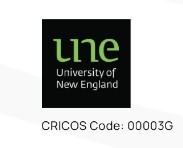
Bachelor of Science/Bachelor of Laws


Overview
5 YEARS
YES
AUD $33,829
FEB JUN OCT
Studying the Bachelor of Science/Bachelor of Laws at UNE will equip you with an extensive portfolio of knowledge and skills to future proof your career. In this comprehensive program of study, you will develop contemporary skills in how to write for, research, argue and apply the law, as well as explore a full breadth of contemporary science topics and issues. You will graduate with knowledge and skills to apply to a wide range of professions, benefitting from UNE's regional, rural and remote expertise in both fields to ensure you are ready to adapt and thrive in a rapidly changing world.
Why study the Bachelor of Science/Bachelor of Laws with UNE?
UNE has a long tradition of delivering innovative education in both science and law.
We are home to Australia’s largest law school outside a capital city, and our research in many fields of science and law is world class. Our researchers are internationally renowned and our collaborations with industry and government produce research of national and international significance.
Our students come from diverse backgrounds, and go on to become active contributors in law, industry, education, government and research. We focus on more than just theory, giving you significant research challenges and real-world case study experiences, where you will also benefit from our specialist understanding of regional, rural and remote issues.
The Bachelor of Science component in this double degree is designed to provide you with the skills and techniques necessary for solving problems associated with a broad of range of issues in science. The extensive range of majors, which are available in established and emerging, generalist and specialist sciences, are all underpinned by cutting-edge research.
In the Bachelor of Laws, you will develop your knowledge in how to write for, research, argue and apply the law in a broad range of law-related occupations. You will also develop the skills to advocate on behalf of others, analyse complex emerging legal issues and conduct your own legal research – practical skills in high demand by a wide range of employers.
With training in law and science you will understand both the legal framework, and the processes and technical factors relating to scientific areas such as genetics, biotechnology, biology, medicinal chemistry and forensic science. This knowledge and understanding is highly valuable across a broad range of areas such as research ethics, intellectual property, forensic evidence and the commercial exploitation of research.
What makes our course different?
This course in science and law gives you opportunities to:
Learn from UNE’s School of Law with specialist expertise in legal issues related to regional, remote and rural Australia, not just metropolitan areas.
Gain versatile knowledge and skills to apply to current and new legal and scientific careers emerging as a result of new technology developments.
Build a solid foundation in critical thinking, communication, problem solving, resilience, flexibility, perseverance and research skills.
Apply your professional judgment and knowledge of the ethical responsibilities associated with a science and law double degree, including an understanding of international and Aboriginal and Torres Strait Islander perspectives.
Access UNE’s state-of-the-art science equipment and facilities used in multidisciplinary research and teaching.
Use innovative technology to study online to balance your work and life commitments or join us on campus and take advantage of our small staff-student ratio and supportive environment.
If you choose to study online, some science units include mandatory intensive schools on campus, which give you the opportunity to interact and engage face-to-face with your peers and academic staff and gain essential practical skills.
Study overseas for a trimester with one of our international partner universities and get credit towards the Science component of your degree while you broaden your global perspective.
Complete a short-term overseas study experience and count it towards your law degree or undertake a work integrated learning unit to enhance your skills and knowledge of law in the workplace.
If you are a high achieving student, you may choose to undertake Honours in law as part of your degree. If you are interested in undertaking Honours in science, you may apply for entry to the Bachelor of Science (Honours) after completing your course. Undertaking an Honours pathway can lead you to higher degree research opportunities and enhance your career options.
Complete two degrees in as little as 5 years (full time) or up to 12 years (part time).
At UNE, our collaborative learning environment allows you to interact directly with friendly academic staff and your peers, supporting your success.
Year after year, students award UNE the maximum 5-star ratings for Overall Experience and Student Support in The Good Universities Guide. We are proud to be Australia’s longest continuous provider of distance (now online) education.
Study online
Most of our students choose to study online across three study periods with 24/7 tutor support* and fit study around work and family commitments. Uniquely, our online students are mostly over 30 and bring valuable experience with them. They form a community of adults juggling the same challenges and priorities and who bring their life and work experience together at UNE in order to become future-fit and better respond to a rapidly changing world.
Study on campus
Many of our students choose to take advantage of the on-campus lifestyle in Armidale, in the beautiful New England region, with access to unparalleled support, accommodation and sporting facilities. These students are often starting their first degree and have left school recently. Through access to academic and career support they get a fantastic start to their careers.
* 24/7 tutor support includes: essay feedback (within 24 hours); live chat 24/7 for generic feedback on academic writing; and subject-specific help at a foundation or first-year level for subjects including mathematics, chemistry, biology, physics, business, accounting, microeconomics, macroeconomics and statistics. There are also a wide range of workshops, resources and courses available in academic skills support to assist you and help you to succeed.
Inquire Now
Entry Requirements
IELTS Academic
English Test Overall Listening Reading Writing Speaking
IELTS Academic 6.5 6.0 6.0 6.5 6.0
The English Language Requirements for admission into this course require the minimum scores shown above. Test results must be attained within 2 years of the date of application for admission.
TOEFL
English Test Overall Listening Reading Writing Speaking
Internet based test (IBT) 91 20 20 22 20
The English Language Requirements for admission into this course require the minimum scores shown above. Test results must be attained within 2 years of the date of application for admission.
Fee
How much will it cost?
Estimated fees for your first year of study in this course are:
Fee type Cost
International $33,829*
Estimated amenities fee per year if studying full-time $351
*Annual course fees only cover the cost of tuition. They do not include other expenses associated with university study such as text books, accommodation and living expenses. If you are successful in gaining admission to study at UNE, the Offer of Admission will list the exact tuition fees you need to pay for your course. Fees quoted cover full-time tuition for two full-time trimesters only. For more information, please see fees and costs.
Scholarship
UNE offers bursaries and scholarships that can help you with the costs of studying and living in Australia.
The UNE International Bursary reduces the published annual tuition fees for international students by up to 20%. These bursaries are available for international students commencing coursework studies at UNE in 2024. View detailed Bursary information.
UNE also offers a number of substantial research scholarships to postgraduate students studying research-based degrees.
Popular Courses
Find your perfect course
Head Office
Kamaladi, Kathmandu
Tel: +977 14542781, 9845566225
E-mail: info@landmarkedu.com
Sydney office
Rockdale, NSW 2216,
Tel: +61 415 122 814
Branch office
Tel: 056-590825
Tel: 021-590828
Tel: 977-71-591694



